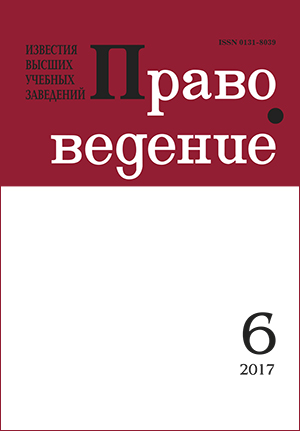Logic and psychology: searching for methodological foundations of law
Abstract
The article discusses the methodological foundations of law based on the logical and psychological material developed by L. I. Petrażycki. The author substantiates the idea of importance of unity of the logical (being purely rational) and psychological (based on human psychics and thus being creative, free and having broad epistemological boundaries) aspects of a cognitive process. The author analyses an attempt to go beyond the purely monistic prerequisites for the development of law and understanding of its essence. In this context Petrażycki’s ideas can be considered integrative as a search for seemingly incomparable theoretical entities. Some ideas expressed by the scientist were not widely supported (such as the provision on rights of animal or inanimate objects). The ideas should be considered not only narrowly, but also in a broader context. This means that the humanistic theories of the psychological school and an appeal to a person as the essence and sense of all legal anthropology could still be relevant. The author demonstrates the continuity of some ideas of Petrażycki, their development by representatives of Petersburg School in the 20th and 21st centuries. The article analyses Petrażycki’s appeal to the logical context. On the one hand, we are dealing with intuition as a method of cognition, on the other hand with the clarity of a formal logical school. Logical and psychological methodology of Petrażycki has become a reflection of this dual problem — a systematic and consistent one, however being formed at the interface of rational approaches and those foundations of knowledge which were connected with the development of other sciences, quite distant from law, at first glance. As shown by the practice of world jurisprudence development, this is a very interesting and promising direction at the very least.
Keywords:
legal methodology, logic, psychology, epistemology, communicative approach, phenomenological theory, philosophy of law
Downloads
References
References
Husserl E. Høffding H. Psikhologicheskaia osnova logicheskikh suzhdenii [The psychological basis of logical judgments]. Moscow, URSS Publ., 2013. 96 p. (In Russian). Moscow, Akademicheskii proekt Publ., 2009. 489 p. (In Russian)
Lepeshko A. B. Kommunikativnyi podkhod k sovershenstvovaniiu natsionalʹnogo zakonodatelʹstva [Communicative approach to the improving of national legislation]. Brest, Alternativa Publ., 2016. 184 p. (In Russian)
Petrazhitsky L. I. Teoriia prava i gosudarstva v sviazi s teoriei nravstvennosti [Theory of law and state in connection with the theory of morality]. St. Petersburg, Lan’ Publ., 2000. 608 p. (In Russian)
Polyakov A. V. Peterburgskaia shkola filosofii prava [Petersburg school of law philosophy]. Izvestiia vuzov. Pravovedenie, 2000, no. 2, pp. 4–23. (In Russian)
Spiridonov L. I., Chestnov I. L. [L. I. Petrażycki: life and scientific heritage].Petrazhitsky L. I. Teoriia prava i gosudarstva v sviazi s teoriei nravstvennosti [Theory of law and state in connection with the theory of morality]. St. Petersburg, Lan’ Publ., 2000, pp. 3–18. (In Russian)
Downloads
Published
How to Cite
Issue
Section
License
Articles of "Pravovedenie" are open access distributed under the terms of the License Agreement with Saint Petersburg State University, which permits to the authors unrestricted distribution and self-archiving free of charge.




